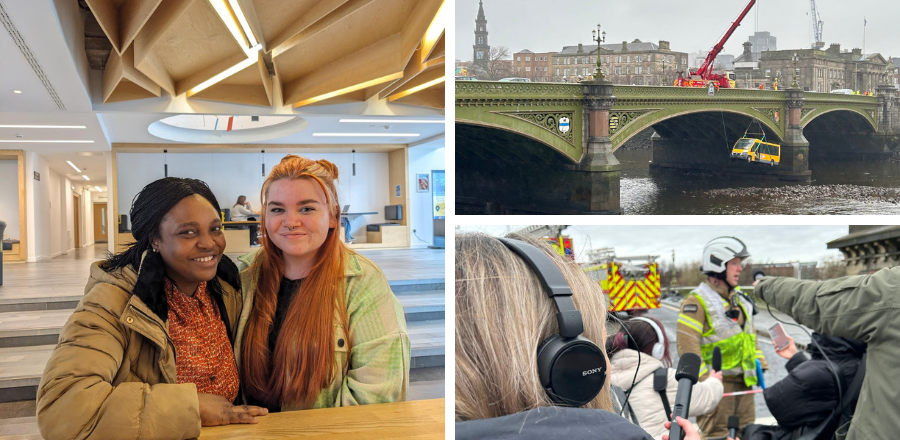Emergency exercise puts journalism students at the heart of the action

GCU students have had the chance to prepare for their future career thanks to an emergency exercise held in the heart of Glasgow.
16 students from the University’s MA Multimedia Journalism course joined emergency services, including paramedic students also studying at GCU.
The exercise, which took place on the 13th of March at Glasgow’s Albert Bridge, involved a number of incidents occurring simultaneously, with the students required to use their journalistic skills to establish the full facts and break the story across different media platforms.
Two of those involved on the day, Fiona Brown and Funmi Jokotade, sat down with us to discuss their experience.
How did this opportunity come about?
Funmi: “Our lecturer told us about the exercise which would be part of our News Day, which we do every Tuesday. This was something I looked forward to personally because it allowed me to learn about responding to a major incident and what the rescue operation would look like.”
Fiona: “We do our news days and we’ve had other reporting classes before Christmas that focused on crime and major incidents. It was good fun to get the opportunity, but I actually wasn’t expecting it to be as hectic as it was!”
What was the situation when you arrived at the scene?
Funmi: “I was there at the beginning of the exercise and a school bus was lowered into the river. The coastguard then came in their boats to try and start the rescue effort. A few minutes later on the bridge, two cars crashed into each other. There was people screaming and it all seemed very realistic! There was then more emergency services on the scene and there was also an aircraft above trying to help rescue the people below and take them to the hospital. There was a lot of dummies used and the number of fatalities had to be counted.”
Fiona: “There was definitely more than 100 people involved. There were actors there and then obviously police, fire brigade, paramedics and coastguard. SEPA (Scottish Environmental Protection Agency) were also there, so you can imagine how busy it all got!
“I think these drills are put on every couple of years. Emergencies like that thankfully don’t happen very often but it’s important that everyone gets to practice. It’s also good for the emergency services to practice getting questions from the press which relate to such a serious situation.”
How did you approach it as trainee journalists?
Fiona: “We were given a brief that gave us all the information we need to know around number of fatalities, number of injuries, number of children, name of the school etc. It was basically a free for all and we just asked as many questions as possible.
“There was 16 of us there in total from GCU. We were put into teams with one focusing on video, one focusing on radio and then one working on print. I worked with the radio team, which was really good.”
Funmi: “I was with the print team – it was a bit stressful but very rewarding! It was definitely something different for me but really useful. I’m from Nigeria and accidents like this happen quite often, so it was good to see how everyone responds.
“I’ve been in Scotland for six or seven months and thankfully not seen anything bad happen, so it was a good one for me to see the system in place for when something does happen. It was reassuring to see the number of emergency services that quickly attend and to know there is a proper procedure in place – lives will be saved. It helps me realise that Scotland is actually a good place to be.
“It was also good experience to deal with distressed parents because it’s all preparation for the future.”
Was it beneficial to have this experience at this point in your career?
Fiona: “When I started this course, I wanted to do arts and music. In all honesty, I didn’t really see myself focusing on hard news and I wasn’t really interested. I now think that was probably more of a self-doubt thing. Being there and being flung in the deep-end helped me realise that I am capable of more and that I’d probably built it up in my head to be a lot harder than it actually is.”
Funmi: “It’s helped me realise that I can find my place here in Scotland. I was thinking that journalism was going to be difficult for me to fit into here, especially around things like politics. I would definitely say this experience helped me because it made me realise I have the skills to create content from a situation like this.”
Would you encourage other students to take on these opportunities?
Funmi: “It definitely gives students confidence and allows them to see things first-hand. I think it’s important to step out of your comfort zone and go into that frontline a couple of times each year. We’re lucky with News Days because it allows us to actually go out and get that practical experience in the same way Nursing students do with placement.”
Fiona: “I’d encourage everyone to go for it. I didn’t participate in anything when I did my Undergraduate. I was a bit of a lone wolf and didn’t really put myself forward or think certain opportunities were for me. Doing the Masters course has basically seen me fling myself in the deep-end. I’d encourage everyone to say yes to everything because you don’t know when you’re going to get another chance.”
Find out more about the MA Multimedia Journalism course here
By Ross Clark
Got an SHLS or GSBS story? Email me at Ross.Clark@gcu.ac.uk or message me on Twitter
